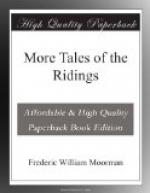Touched with regret for what I had done, and yet unable to understand why it had moved her so deeply, I asked what was troubling her mind. For a few moments she was silent, and then, in a more tranquil voice, replied: “I can’t bear to see anybody laiking wi’ ashes.”
“Why, what does it matter?” I asked, and, in the hope that I might help her to regain her composure I began to make fun of her superstitious fancies. But Grannie refused to be laughed out of her beliefs.
“It’s not superstition at all,” were her words; “it’s bitter truth, and I’ve proved it misen, to my cost.”
Seeing how disturbed she was in her mind I tried to change the subject, but she would not let me. For about half-a-minute she was silent, lost in thought, her grey eyes taking on a steeliness which I had not seen in them before. Then she turned to me and asked: “Has thou iver heerd tell o’ ash-riddling?”
“Of course I have,” I replied. “Everybody knows what it is to riddle ashes.”
“Aye, but ash-riddling on the hearthstone, the neet afore St Mark’s Day?”
Here was something unfamiliar, and I readily confessed my ignorance. It was evident, too, that Grannie’s mind could only find relief by disburdening itself of the weight which lay upon it, so I no longer attempted to direct her thoughts into a new channel.
“It was 1870,” she began, “the year o’ the Franco-German War, that I first heerd tell o’ ash-riddling, and it came about this way. My man’s father, Owd Jerry, as fowks called him, were living wi’ us then; he was a widower, and well-nigh eighty year owd. He’d been a despert good farmer in his time, but he’d gotten owd and rheumatic, and his temper were noan o’ the best. He were as touchous as a sick barn, if aught went wrang wi’ him. Well, one day i’ lambing-time, he were warr nor he’d iver been afore; he knew that I were thrang wi’ all maks o’ wark, but nowt that I could do for him were reet. So at last, when I’d fmished my milking i’ the mistal, I got him to bed, and then I sat misen down by the fire and had a reet good roar. I were tired to death, and wished that I’d niver been born. Iverything had gone agee that day: butter wouldn’t coom, Snowball had kicked ower the pail while I was milking her, and, atop o’ all that, there was grandfather wi’ his fratching ways.
“I were sat cowered ower the fire, wi’ my face buried in my hands, when my man came in and axed what were wrang wi’ me. At first I wouldn’t tell him, but enow he dragged it all out o’ me, and in the end I was glad on ’t. But he nobbut laughed when I told him about Owd Jerry, and he said he’d allus been like that wi’ women fowks; ‘twere his way o’ getting what he wanted. I got my dander up at that, and said he’d have to get shut o’ his fratching if he lived wi’ us.”
“‘I reckon he’ll noan mend his ways,’ said Mike, ’now he’s close on eighty.’ So I said if that were the case it would be a good thing for the peace o’ the family when he were putten under grund. Yon were gaumless words, and bitter did I rue iver having spokken ’em. But Mike nobbut laughed at what I said. “‘Putten under grund!’ said he. ’Nay, father will live while he’s ninety, or happen a hunderd; he’s as tough as a yak-stowp.’




